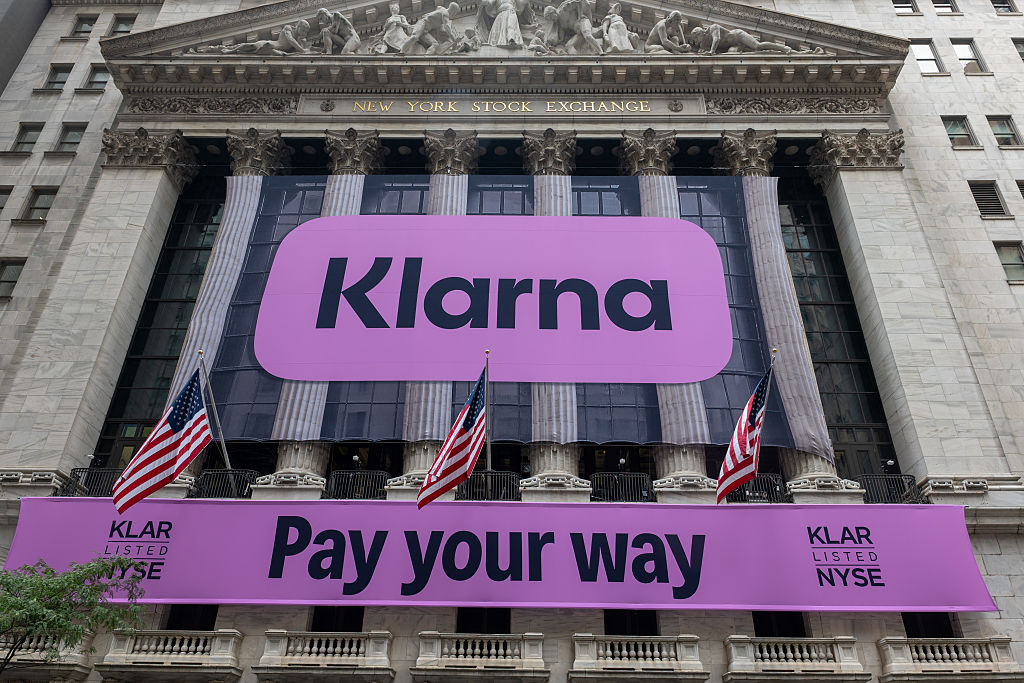Klarna IPO: how did the Swedish fintech perform on debut?
Klarna’s shares made a fast start following the BNPL company’s New York debut, but momentum waned later on. Should you invest in Klarna shares?


Get the latest financial news, insights and expert analysis from our award-winning MoneyWeek team, to help you understand what really matters when it comes to your finances.
You are now subscribed
Your newsletter sign-up was successful
Want to add more newsletters?

Twice daily
MoneyWeek
Get the latest financial news, insights and expert analysis from our award-winning MoneyWeek team, to help you understand what really matters when it comes to your finances.

Four times a week
Look After My Bills
Sign up to our free money-saving newsletter, filled with the latest news and expert advice to help you find the best tips and deals for managing your bills. Start saving today!
Shares in Klarna, the Swedish buy now, pay later platform, closed their first day of trading 15% above their offering price following Wednesday’s (10 September) IPO.
Klarna shares debuted on the New York Stock Exchange under the ticker KLAR. The shares opened at $52 – about 30% above its IPO price of $40 – and rose as high as $57.20 during the first session. By the close of the session, though, the shares had pared back to $45.82.
“Momentum waned as the day went on,” said Russ Mould, investment director at AJ Bell. “This might simply be early investors banking some gains or day traders going in and out quickly, deciding the loss of momentum in the shares soon after the market open didn’t warrant hanging around.”
MoneyWeek
Subscribe to MoneyWeek today and get your first six magazine issues absolutely FREE

Sign up to Money Morning
Don't miss the latest investment and personal finances news, market analysis, plus money-saving tips with our free twice-daily newsletter
Don't miss the latest investment and personal finances news, market analysis, plus money-saving tips with our free twice-daily newsletter
The closing price gave Klarna a market capitalisation of $17.3 billion according to Yahoo Finance. This is lower than US-based rival Affirm (NASDAQ:AFRM), which is valued at $27.6 billion, and well below the $45.6 billion valuation it achieved during a fundraising round in 2021.
“Klarna has done its homework before the IPO,” said Niklas Kammer, equity analyst at Morningstar Equity Research. “It has recently signed multiple agreements with payment services providers, which will significantly broaden its reach as a payment method this year and in the years to come.”
The IPO netted Klarna around $222 million, while major backer Sequoia has generated an overall return of $2.65 billion from its $500 million invested in Klarna since 2010, according to CNBC.
Klarna shares opened the second day after the company's IPO 0.7% below their first session's closing price.
The background to Klarna’s New York IPO
Klarna postponed its IPO in April, thanks to the disruptive impact of Donald Trump’s tariffs on the market.
But the success of Wednesday’s IPO underscores the notion that the market is improving for prospective debutants.
“A strong after-market could convince other fintechs to take the plunge into public markets,” said Mould. “The danger is that one good deal begets a few more and then a torrent of less good ones follows behind.”
It is, however, another example of European companies eschewing their local markets in favour of a US listing.
CEO and co-founder Sebastian Siemiatkowski told an interview with Associated Press ahead of the IPO that the decision to list in the US reflected the fact that the country represents its greatest growth opportunity.
“It’s the largest consumer market in the world, and it’s the biggest credit card market in the world,” said Siemiatkowski. “It’s a tremendous opportunity, from our perspective.”
Should you buy Klarna shares?
Mould highlighted that the trajectory of Klarna’s share price following the IPO was unusual.
“It’s more common to see popular IPOs creep higher over a few weeks and then pull back as short-term traders exit and longer-term investors subsequently build positions, driving the shares back up,” he said. “Clearly, some investors don’t believe it is worth owning at the current price. Whether that’s a straight valuation call or concerns about the business model and its prospects remains to be seen.”
Other experts, though, are more optimistic. Kammer’s analysis for Morningstar states that “we think investors should take a close look at the new addition to the New York Stock Exchange and consider purchasing shares if they can”.
“Growth is what it is all about for Klarna,” said Kammer. “While its platform is currently just breaking even, starting to eke out a marginal operating profit, the company is poised for a big shift. As its platform scales and its underwriting models are enriched with more shopper behaviour data, we anticipate profitability to improve.”
Kammer expects Klarna’s operating costs to increase in the future as it reverses previous reductions in headcount. Siemiatkowski had previously suggested that thousands of staff could be effectively replaced with artificial intelligence (AI), but has since backtracked on this.
“While Klarna operates as a platform, its success hinges on investments in customer-facing staff,” said Kammer, adding that “these investments are critical to unlocking Klarna’s growth potential.”
“We project Klarna to achieve a 30% operating profit margin by 2034, with earnings per share increasing by 30% annually starting from 2025,” said Kammer.
Get the latest financial news, insights and expert analysis from our award-winning MoneyWeek team, to help you understand what really matters when it comes to your finances.

Dan is a financial journalist who, prior to joining MoneyWeek, spent five years writing for OPTO, an investment magazine focused on growth and technology stocks, ETFs and thematic investing.
Before becoming a writer, Dan spent six years working in talent acquisition in the tech sector, including for credit scoring start-up ClearScore where he first developed an interest in personal finance.
Dan studied Social Anthropology and Management at Sidney Sussex College and the Judge Business School, Cambridge University. Outside finance, he also enjoys travel writing, and has edited two published travel books.
-
 Should you buy an active ETF?
Should you buy an active ETF?ETFs are often mischaracterised as passive products, but they can be a convenient way to add active management to your portfolio
-
 Power up your pension before 5 April – easy ways to save before the tax year end
Power up your pension before 5 April – easy ways to save before the tax year endWith the end of the tax year looming, pension savers currently have a window to review and maximise what’s going into their retirement funds – we look at how
-
 Three key winners from the AI boom and beyond
Three key winners from the AI boom and beyondJames Harries of the Trojan Global Income Fund picks three promising stocks that transcend the hype of the AI boom
-
 'AI is the real deal – it will change our world in more ways than we can imagine'
'AI is the real deal – it will change our world in more ways than we can imagine'Interview Rob Arnott of Research Affiliates talks to Andrew Van Sickle about the AI bubble, the impact of tariffs on inflation and the outlook for gold and China
-
 Three promising emerging-market stocks to diversify your portfolio
Three promising emerging-market stocks to diversify your portfolioOpinion Omar Negyal, portfolio manager, JPMorgan Global Emerging Markets Income Trust, highlights three emerging-market stocks where he’d put his money
-
 New year, same market forecasts
New year, same market forecastsForecasts from banks and brokers are as bullish as ever this year, but there is less conviction about the US, says Cris Sholto Heaton
-
 How to profit from the UK leisure sector in 2026
How to profit from the UK leisure sector in 2026The UK leisure sector had a straitened few years but now have cash in the bank and are ready to splurge. The sector is best placed to profit
-
 Metals and AI power emerging markets
Metals and AI power emerging marketsThis year’s big emerging market winners have tended to offer exposure to one of 2025’s two winning trends – AI-focused tech and the global metals rally
-
 Quality emerging market companies with consistent returns
Quality emerging market companies with consistent returnsOpinion Mark Hammonds, portfolio manager at Guinness Global Investors, selects three emerging market stocks where he'd put his money
-
 Coreweave is on borrowed time
Coreweave is on borrowed timeAI infrastructure firm Coreweave is heading for trouble and is absurdly pricey, says Matthew Partridge